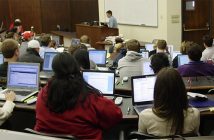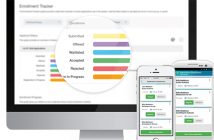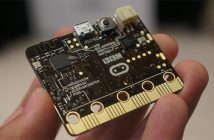
A new report from the OECD shows that “moderate” technology use in the classroom can improve learning, but that too much screen time is linked with a decrease in performance.
The report, entitled “Students, Computers and Learning: Making the Connection,” was released by the Organisation for Economic Co-operation and Development who based the study on Programme for International Student Assessment (PISA) results. The PISA tests are given to 60,000 15-year-olds in 32 countries and the data is used to analyze the school systems between nations.
The report states that the implementation of technology is not an automatic achievement-booster:
Limited use of computers at school may be better than no use at all, but levels of computer use above the current … average are associated with significantly poorer results.
Put simply, ensuring that every child reaches a baseline level of proficiency in reading and mathematics seems to do more to create equal opportunities in a digital world than can be achieved by expanding or subsidizing access to high-tech devices and services.
Moderation is key, writes Joy Resmovits in the Los Angeles Times. Students should use computers only for certain activities that really benefit from the addition of technology. Students who use computers for drills in school at least once a week score more than 20 points lower than students who don’t.
OECD education director Andreas Schleicher suggested that how we view technology in the classroom should be re-evaluated:
Students who use computers very frequently in school don’t outperform students who use them moderately, even when we modify for social background.
If you have 21st century technology added to 20th century classrooms, it might be unrelated and take opportunities away. Schools probably haven’t become good enough at the kind of pedagogies that use technology well.
If it’s used on a smaller scale, which is more useful, it’s usually more interactive teaching. If you want students to become smarter than a smartphone you have to think about instructional methodology and learning environment.
We are quite disappointed by the findings in general. Bringing technologies to the classroom didn’t seem to be related to positive skills outcomes.
According to a survey, students in OECD countries spent around 25 minutes online at school. Australia came in the highest with about 58 minutes, and South Korean students spent less than ten, reports Business Insider.
American students taking the PISA felt more comfortable answering questions from a keyboard. They scored better on the digital reading test than on paper, scoring slightly above average. The math test had similar results, with digital scores around the OECD average, and below average scores on the paper test.
The group also administered a digital skills test dealing with navigating web pages, using browsers, and making charts on the computer, according to Arjun Kharpal of CNBC. The list top-performing countries (Singapore, South Korea, Hong Kong, Japan, Canada, and Shanghai) closely mirrors the results of the organization’s 2012 print reading test, implying that basic and traditional skills are all one really needs to succeed in a digital environment.
Students who spend six hours online every weekday were more likely to report feeling lonely at school and arriving late or skipping school in the two weeks before the test.
In 2012, 96% of 15-year-olds in OECD countries said that they had a computer at home, but only 72% said that they use computers or tablets at school, Schleicher writes in a BBC piece. For some countries, the number was less than half.




